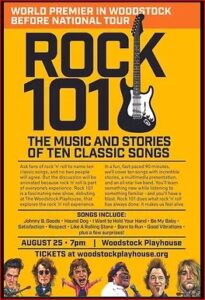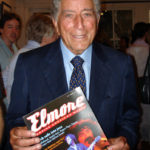 Rutgers Professor Louis Masur strode onstage in a state of excitement. We were about to examine songs “that influenced not only music, but society and culture,” aided by an onstage six-piece band and a dazzling presentation of video clips, photos, quotes and news reports. And away we went.
Rutgers Professor Louis Masur strode onstage in a state of excitement. We were about to examine songs “that influenced not only music, but society and culture,” aided by an onstage six-piece band and a dazzling presentation of video clips, photos, quotes and news reports. And away we went.
Masur interwove song, artist and cultural facts together to make compelling cases for each song’s importance. His evidence included song lyrics (Aretha Franklin reconfigured Otis Redding’s “Respect” to fashion a shockwave-generating feminist statement); newsworthy events (“Johnny B Goode” was went into space on the Voyager mission, along with Bach, Stravinsky, Beethoven and Louis Armstrong); music theory (early rock replaced the saxophone with the guitar; the Beatles changed melodies from traditional blues chord progressions to jazz), artists’ biographies (Sonny Bono and Cher were backup artists on the Ronettes’ “Be My Baby”); music history (lots of that: from the Rolling Stones opening for the Ronettes to the Beatles’ German version of “I Want to Hold Your Hand”); to cultural markers (one-third of our the population tuned in to watch Elvis Presley on TV) .
The multimedia presentation provided depth. A clip from The Wild One (1953) showed biker Marlon Brando being asked, “What are you rebelling against?” “Whattdaya got?” Brando deadpans. A breathtakingly beautiful photo of young Elvis Presley—eye makeup and all, revolutionary at the time—pointed out his androgynous appeal, when most of us recall the hip-shaking hottie.
The very competent band demonstrated the songs’ individual quirks, like chord progressions or drum fills during the song’s history, but after each history, played that song in its entirety to tie the parts together. The audience was encouraged to sing along, which they certainly did. The show ended with “Good Vibrations” (1966, same year as the Beatles’ Revolver), the only song they had any trouble with. No matter: I interviewed a member of the legendary backing band, the Wrecking Crew (which Masur referenced several times), who told me the band knew the music so well that the only songs the members had to practice were Beach Boys songs, because they are deceptively complicated.
Few of us are the music historian that Louis Masur is, but I’ve spent time with members of eight of the ten bands in the lecture, and I learned something about those songs every two or three minutes for 90 minutes. I wish all educators had Professor Masur’s gift.
Happily, the show’s going on the road. Check out the an upcoming show HERE or find a show near you, and be glad you did.
—Suzanne Cadgène







Be the first to comment!